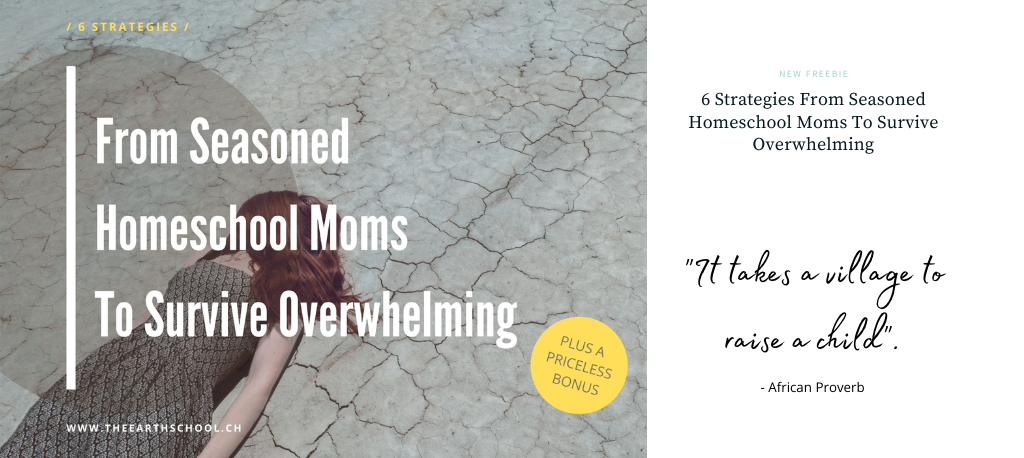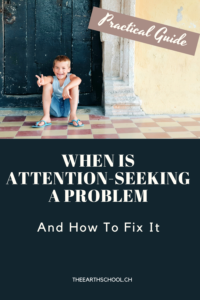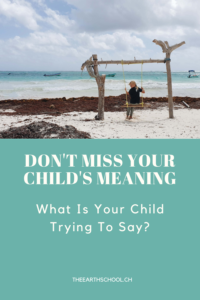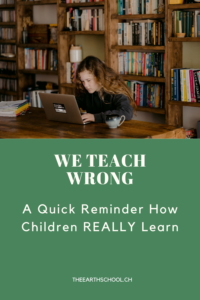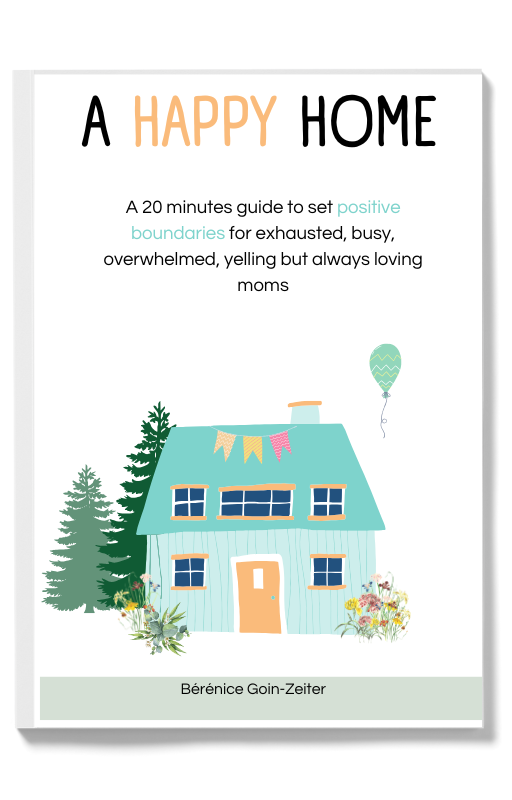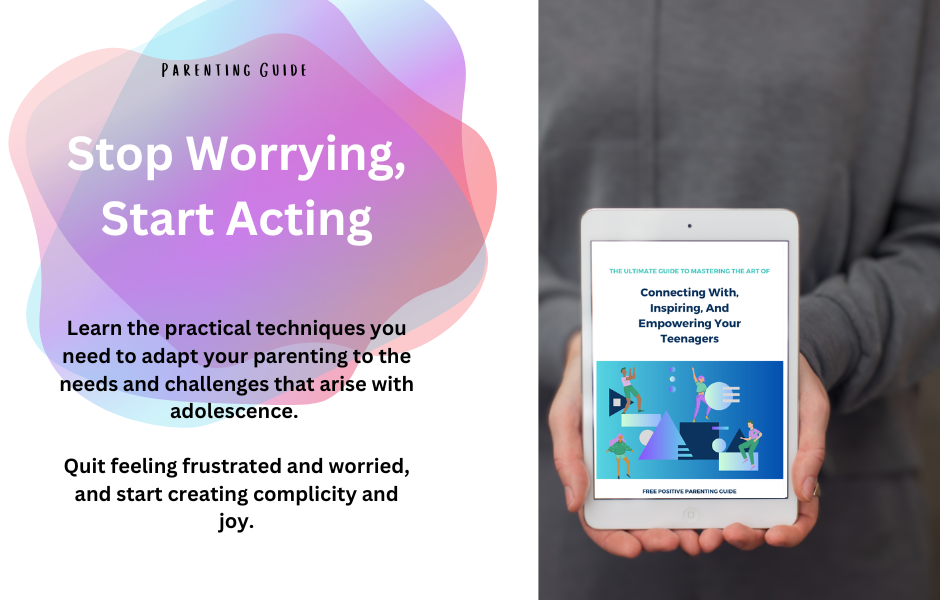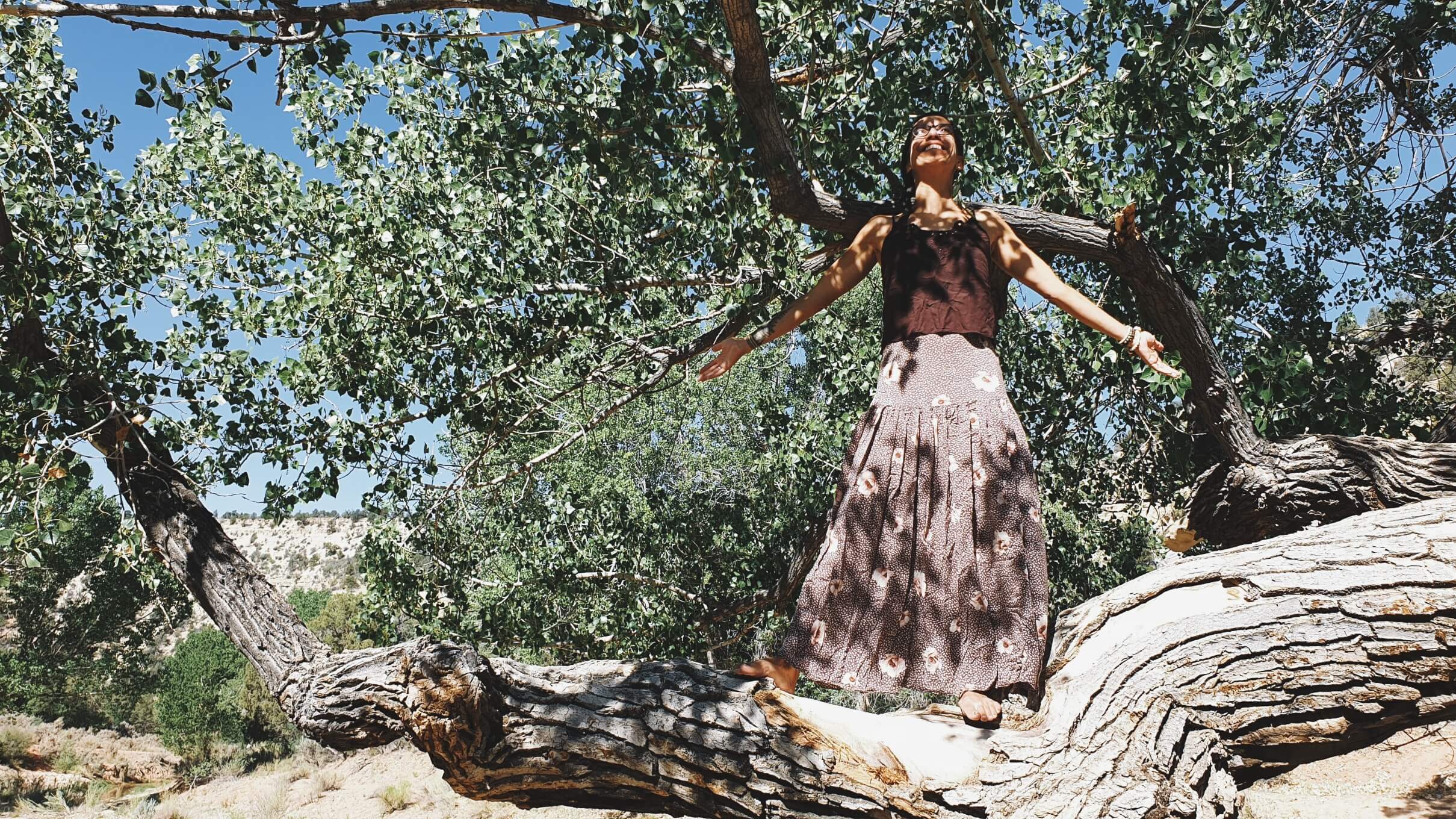
#40 Can You Raise A Child And Still Keep Them Free? The Challenges Of Education
There are big chances that you were raised to become a proficient member of our society, hard worker, tamed, and profitable.
I know it is not something everyone wants to hear, we like to think we have control over our lives. But how much of it is on you truly?
Want to read this later? Grab the PDF
How You And I Were Raised: The Challenges Of Our Education
I was born in Switzerland, and that made me grow up with some specific values. I only nailed down Swiss values once I started to travel. « The Swiss value cleanliness, honesty, hard work, and material possessions. They are very proud of their environment and have a long tradition of freedom ». (http://www.ediplomat.com).
Have you ever wondered what are the values of your country?
Here is what I found for England: « In England, politeness, reserve, and restraint are admired. The English are courteous, unassuming and unabrasive and are very proud of their long and rich history ».
And for Americans, the University of Portland shares that their main values are individualism, equality, and informality. They are more into the future than interested in history and they believe in achievement, action, work, and materialism.
I invite you to do some research, it is quite interesting. Do not think your country didn’t influence who you are!
I grew up speaking French. We often don’t think about it but our language has an influence on our minds. For example, in French, we use feminine and masculine not only for people but for inanimate objects too.
What is your mother tongue? What do you find specific about it?
I grew up in a small village, in the countryside. I used to go on holiday to my cousins’ place in town and remember finding it scary; the buses, the pedestrian’s traffic lights, the noise, the commotion,… Country life makes you closer to your neighbor and develops your sense of community. While in a city you have more opportunities and possibilities. City people tend to be more into arts, museums,s and cultural life in general as they have easy access to it while country people tend to be closer to nature and respectful of it.
Did you grow a city dweller or a country child? How do you think this influenced who you are?
My parents were blue-collar. My dad used to work in a factory and my mom is from a farmer family. Eventually, she graduated as a social worker but always remained very attached to her working-class values. The upper class (pretty thin in a village) was living on a hill, didn’t come to football matches and didn’t it grilled sausages. I was taught honesty, humility, hard work, and modest dreams.
What were your parent’s jobs as you grew up? What values did they share with you?
We found that the way parents discipline their children is strongly influenced by these social values, and likely serves to perpetuate these values from one generation to the next.- Toddlers, Parents, and Culture)
How Education Impacts A Child’s Freedom
I attended a public school (state school) in my village. At 11 years old, I was directed to the « smart children class » (there were 3 levels; those supposed to get a degree later, those supposed to learn a profession through apprenticeship, and the others, supposedly the future workmen, waitresses, and hairdressers). That is how, in Switzerland, you’re future was decided over a year, from 10 to 11.
How free were you to choose what you studied at school?

Of all those predicaments, school feels like the strongest tool society has to tame children. The educational system is not based on research on how children learn and develop their abilities, it was created by the Christian church during the Protestant Reformation to teach children to read the Bible and trust the Church’s message without questioning it.
When the governments took over, they kept the same structure of teaching-and-testing, using rewards and punishments. This system works well for indoctrination but does little to develop essential skills like self-esteem, curiosity, or perseverance. Most students have lost the desire to learn arrived at the middle of their school years. We consider school education like a necessary pain, a bitter medicine to swallow, but the truth is, it is not the way for children to learn.

Have you observed how young children, from their birth to school age, learn so much by themselves? They learn to talk, walk, eat, behave in society, make friends, nurture relationships, how to use tools and toys,… They learn all that their way, the natural way, by playing, by modeling, by trial and error, by experimenting. How come we don’t find those natural abilities in the educational system? Simple, it’s not made to learn.
At school, you learn to follow meaningless requirements, to be tested and evaluated, to trust someone else with your own value, to be held accountable, and to respect authority.
 During all my school years, I’ve felt on rails, and I grew more and more disappointed as I went from school to high school and then to University. The promise I’ve been hearing my all childhood (« it gets better ») never came true.
During all my school years, I’ve felt on rails, and I grew more and more disappointed as I went from school to high school and then to University. The promise I’ve been hearing my all childhood (« it gets better ») never came true.
Want To Raise Free Children? Download Our Free Cheat-Sheet!
The Challenges Of Getting Back Your Freedom
Some of us decided to follow our path anyway, later in life, and reclaim our freedom. Usually, it means being judged to some extend by society, your family, and your friends.
There is a wonderful French song called The Bad Reputation, and it summons it well (listen to this pretty good English translation). Walk out of the line and people’s first reaction is to reject you, to fear you.
I know it sounds like I am criticizing society in this blog post, but I am not. I am showing you how you are less free than you think because you carry the values of the culture that raised you. Those of you who did choose a different path know that it takes energy and faith and that sometimes getting back into tracks sounds easier and less demanding.
Freedom is poorly looked upon by governments. A real example for all you homeschool moms is homeschooling. Regulation is very strict in several states in Switzerland, it is illegal in Germany, Spain and the Netherlands, while the regulation is so strict in Sweden it’s not allowed de facto. Another example is how governments force nomads to settle (the Tibetian yak-and-sheep herder, Ugandan herders, the Native Americans whose reservations were a clear move from the government to control them, the Kurdish tribes in Iran,…).

Don’t take me wrong. I am not preaching anarchy and I am not rejecting society. I am grateful for what society offers me. But I also want to feel entitled to enjoy my freedom. And I can see first-hand that my way of life disturbs a lot of the people I meet, which made me wonder why, and realize it is because they were taught that homeschooling, nomadic life, not having a regular job, are bad things. And it makes me feel guilty and second-guessing myself.
I am not a revolutionary at heart, I believe in our democratic values and in the value of human life. But I am a rebel at heart, and when I see an injustice, I name it. In our days, the injustice for me is that we don’t teach children to be free. Free to do what they want with their lives, to become free-thinkers, to explore and experiment
So HOW can we help our children to grow into free adults from the start? How can we save them the pain and sweat of breaking free from an education that taught them the contrary?
How To Raise A Free Child: The Challenges Of Education
How can you give your child a great education, one that will serve them later, while not cutting into their freedom? We all want the best for our children. We want them to thrive and do whatever they want in their future (I guess that’s how you feel if you’re still reading this post). And we fear that a lack of knowledge, of “school”, might be a handicap.
Since we can’t know what knowledge will be most needed in the future, it is senseless to try to teach it in advance. Instead, we should try to turn out people who love learning so much and learn so well that they will be able to learn whatever needs to be learned. – John Holt
I love this quote because I cherish the idea of people who love learning. If your children love to learn, and if they know how to learn, then nothing will ever be beyond their reach.
The main issue is that what you learned growing up is what you don’t want to pass on to your child. Not only the cultural values about hard-working (hard-working not being the issue but the hard-working for someone else is), settling, and being productive, but also all the racial and gender inequalities (the top of the top being a white rich and powerful man), or your family values (“no artists in this family”, “don’t get too rich”, “money is bad”, “we’re not racists but they are different”, “you need a degree”, “degrees are not for us, get a job”,…).
Mainly, what I am suggesting to you is to follow your head less, and your heart more. Here is a little list I like to have on my fridge, just to remind myself that there is a different way and that I actually like this other way better, but I tend to forget it because of the force of habit.
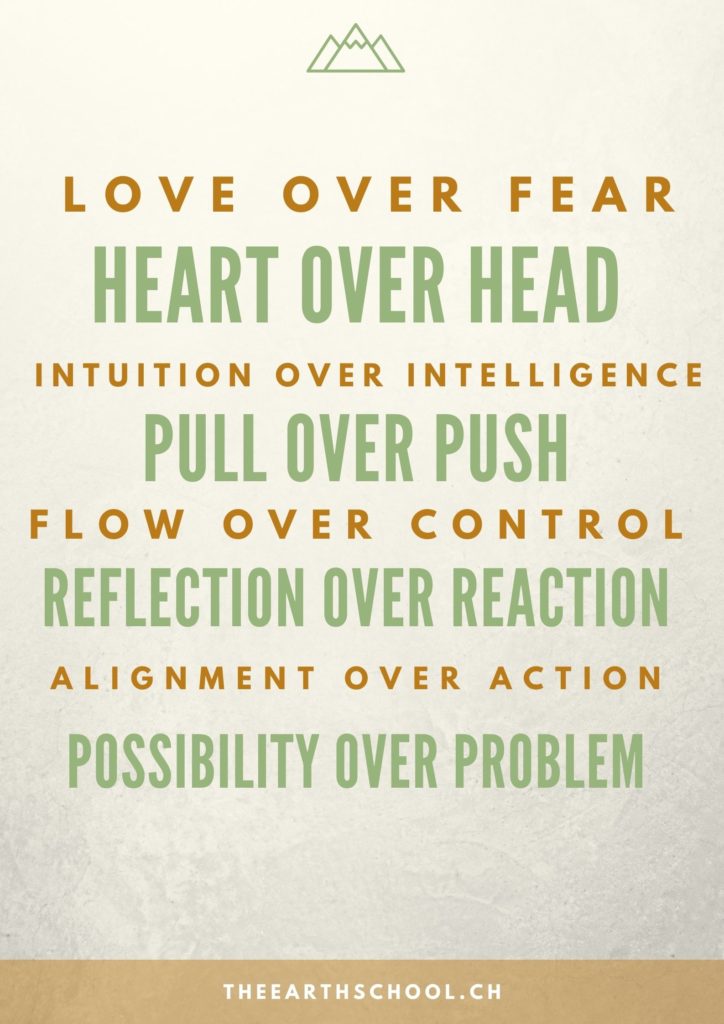
The idea behind all those statements is this one: be more connected to yourself, to your deep self, to your intuition, and less to your intellect, your beliefs, your thoughts.
How can you practice that? Let me share a few clues from a French coach to put you on your way 😉
Follow Your Intuition To Raise Free Children
Following one’s intuition means to trust something intangible, something you cannot see and for which you have no proof. Not so easy in our scientific intellectual culture!
Following your intuition requires you to trust a knowledge you cannot link to any rational intelligence, but come to think of it, how many times have you already followed this little inner voice? We all use our intuition, and what I offer you today is to develop this natural gift to make freer decisions.
1 | Develop your empathy
Be attentive and empathetic towards others of course, but also to yourself and to your environment. What are your emotions saying? Start to listen instead of burying.
2 | Listen to your body
Our body is talking to us a lot, it is the voice of our intuition. When you’re about to make a decision, for example, feel how your body responds: your heartbeat, your breathing, a feeling of contentment, stress?
3 | Practice being calm
The calmer you are, the more chances you will hear your intuition. Learn to feel your emotions, accept them and let them pass through you to regain your calm. Breath in and breath out, and ground yourself as you breathe out, it will help to connect yourself… with yourself!
4 | Start a notebook
Write down your feelings, your dreams, your ideas, and your intuitions. You can come back to it later and see if you listened to yourself or not, if it worked out or not, and gently build your confidence in your emotions. I kept such a diary for several months and writing down my intuition growing was very rewarding.
By connecting with your intuition, you raise yourself above the values and beliefs that were instilled in you and you give your children a more authentic education. Teach those same skills to your child and they will learn to listen to themselves rather than to others.
Don’t let the inspiration fades and take action right away:

1. Download our cheat sheet, it’s on the house. Decide on one action you will implement from today and write it down
3. Share this article with a friend who could benefit from it
4. Join us on Instagram for more great content
I wish you all the best with your kids, always remember that we all do the best we can at a given moment, so never judge yourself harshly. Be confident and listen to your intuition. If what you do comes from a place of love, then you’re on the right path.
See you next week for another exciting article!

Do you want more?
Don’t Forget To Join Our Community To Get Inspiration And Tips Straight in Your Mailbox
I wish you all the best with your kids. Always remember — we’re all doing the best we can in any given moment, so try not to judge yourself too harshly. Be confident and listen to your intuition. If what you do comes from a place of love, then you’re already on the right path.

If this post resonated with you — if you’ve ever walked ten paces behind your child, wondering if you’re ruining everything — come join us on Instagram.
It’s where I share reminders, reflections, and the odd parenting confession… for mums figuring it out one heart-twinge at a time.


